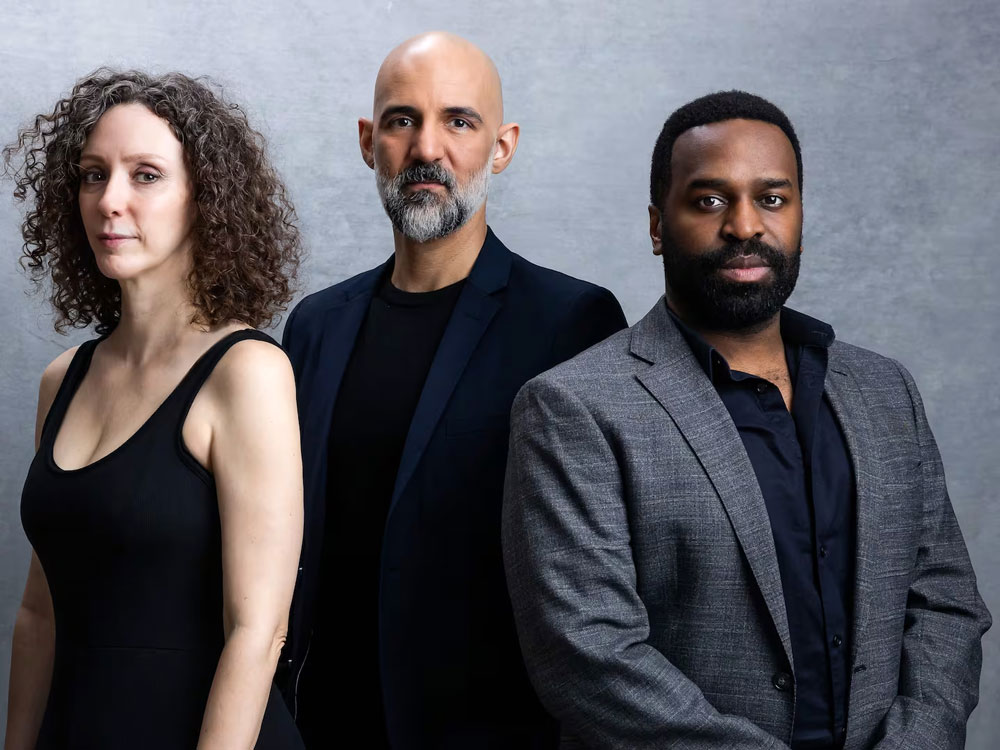
Jun 28
Body Contact: Jess Meyer Coordinates Intimacy in Commonwealth Shakespeare's 'The Winter's Tale'
Kilian Melloy READ TIME: 7 MIN.
The Commonwealth Shakespeare Company marks its 28th season with "The Winter's Tale," presented free of charge on the Boston Common from July 16 – August 4.
"King Leontes of Sicilia falsely accuses his wife, Hermione, of infidelity with his best friend, the King of Bohemia," CSC's synopsis of the play explains. "Inflamed with jealousy and convinced that he is right, Leontes' torment causes a storm of loss. Shakespeare's 'The Winter's Tale' is a captivating parable of betrayals, renewed hope, and the transformative power of time."
Nael Nacer leads the cast in the role of Leontes, with Marianna Bassham playing Hermione and Omar Robinson playing Polixenes, the King of Bohemia. Other luminaries of the Boston theater scene round out the cast, among them Paula Plum, Richard Snee, Robert Walsh, Tony Estrella, and others.
An unusual blend of tragedy and comedy, "The Winter's Tale" boasts one of the Shakespearean canon's most unusual endings (not to mention the famous stage direction "Exit, pursued by a bear"). In the hands of the CSC, which presents handsome outdoor productions every summer – and under the direction of CSC Associate Artistic Director Bryn Boice – the play promises to enchant and delight.
EDGE caught up with the play's fight and intimacy coordinator, Jess Meyer, to find out more about the production. A self-described "non-binary, transgender theater artist," Meyer has worked alongside Boice for years and possess an in-depth familiarity with the Shakespearean canon that allows them to combine theatrical sensibilities with technical expertise and put meaningful action to Shakespeare's poetic dialogue. Moreover, this play in particular holds special resonance for Meyer, as they explain in our conversation.

Source: Nile Scott Studios
EDGE: "The Winter's Tale" is something of a strange play. What do you make of it?
Jess Meyer: When we talk about problem plays as a genre, I am fascinated by Shakespeare's canon and, in general, plays in we are not able to categorize into one box. As a non-binary theater artist, I very much resonate to that. I can't be confined by one label, one thing, one facet of my being. And I think there's something interesting to me about problem plays requiring the audience to engage with the piece more actively than they normally have to.
I'm also interested in the inversion. A lot of the times, tragedies are comedies before they're not. When we look at "Romeo + Juliet," it's a hilarious script until somebody dies, and then it's a tragedy from there on out. We get the inverse of that in this particular piece: We get tragedy, tragedy, tragedy, until somebody gets married.
EDGE: Shakespeare's plays often have queer themes, such as when characters disguise themselves as the opposite gender and then somebody falls in love with them. That's not happening in "The Winter's Tale," but do you pick up on queer themes here in other ways?
Jess Meyer: Absolutely. I think there are queer themes throughout his canon. No matter what play you're looking at, there's always the underlying notion of, "When this was performed, it was performed by people who all identified as cis males." When we put it through that lens, everything about this is queer. The idea of, "Oh, we're having someone that is a cis female, or maybe a trans person, dressing up as a man to navigate society in a way that keeps them safe" feels to me a lot like the existence of myself as a trans person.
[In "The Winter's Tale" specifically], when we look at Hermione and her relationship with [her friend, the noblewoman] Paulina, there is queer love there. We may not identify that as romantic queer love, but love manifests in so many different kinds of relationships. The lengths to which [Paulina] is able to go for Hermione is not just as her queen, not just as her friend, but something beyond that tangible iteration of title. Nothing is stronger than her relationship to Hermione. It is the thing she fights for most.
EDGE: Is intimacy direction really that different from fight direction?
Jess Meyer: I think there is a common misconception in fight and intimacy being polar opposites. Intimacy coordination and fight coordination are two sides of the same sword. You require contact. You are simulating the same level of contact, whether it's dangerous or intimate. You are putting your body through an experience that it does not know [isn't real]. I just did "A Midsummer Night's Dream," and every single scene had a moment of contact of some kind, and most had one that that was both violent and intimate.
You need to be specific about where you're targeting with a sword, as much as you need to be specific about where you're putting your hand on somebody's back. To me, they are intertwined in the way that all the dichotomies of "The Winter's Tale" exist: We get comedy and tragedy, romance and jealousy, and these dichotomies coexisting and holding two truths at the same time.
EDGE: You're also working with one of Boston's most acclaimed directors, Bryn Boice. How do you two mesh in putting this production together?
Jess Meyer: Bryn is our modern incarnation of Shakespeare. She is one of the most brilliant artists I have ever known. We have a very strong working relationship; I have served as her assistant director in Commonwealth Shakespeare Company, and I love working with Bryn because we come at it with a similar background in our training, but from completely different perspectives. She is a cis woman; I am a trans, non-binary person. Bryn loves putting women in roles; she wants to see women in Shakespeare. I come at it from a very gender-focused perspective, where I'm like, "I want everybody to play roles that are not their own gender," unless it's something that feels like it is required that a person of that gender should be in that role. I love to see inversion. I love to see what different bodies and perspectives and people can bring into Shakespeare's canon, from a sense of play, but also, as we see so much in Shakespeare's canon, the discussion of identity and different demographics, and how relationships of identity exist within power dynamics.
Kilian Melloy serves as EDGE Media Network's Associate Arts Editor and Staff Contributor. His professional memberships include the National Lesbian & Gay Journalists Association, the Boston Online Film Critics Association, The Gay and Lesbian Entertainment Critics Association, and the Boston Theater Critics Association's Elliot Norton Awards Committee.







